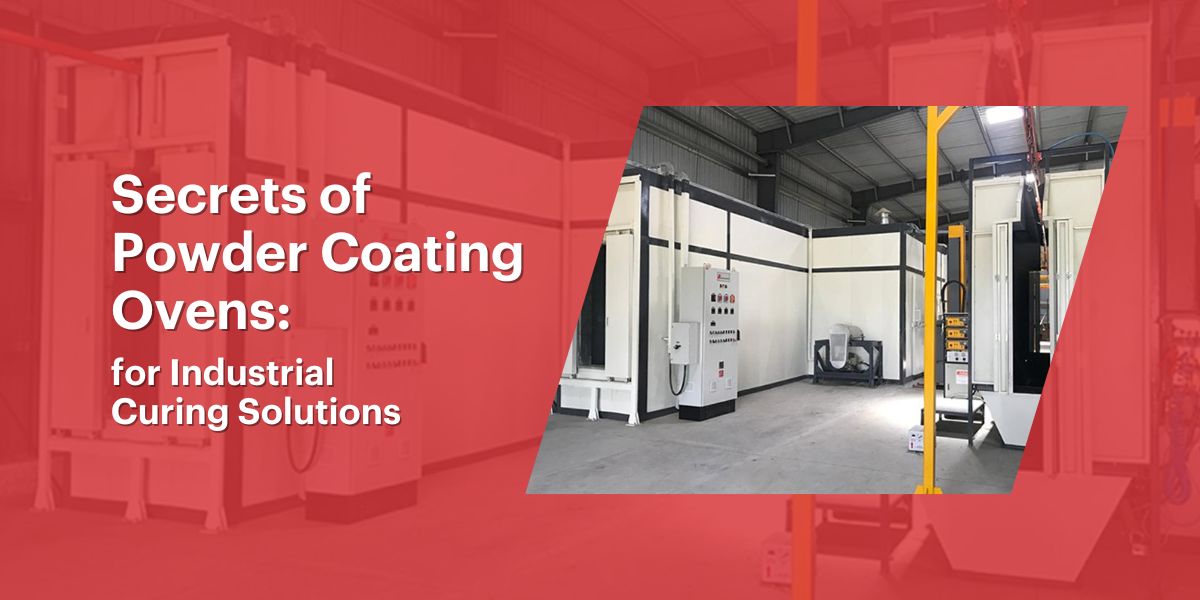A powder coating oven is a specialized industrial equipment used to cure powder coatings on metal surfaces. The industrial powder coating oven’s primary function is to apply heat and maintain a precise temperature to ensure the powder coating adheres properly and fully cures.
Key aspects to consider Industrial Powder Coating Ovens:
Design and Construction
- Industrial Powder coating ovens can vary in size, ranging from bench-top models to large industrial units.
- Common materials used for construction include galvanized steel, stainless steel and ceramic fiber insulation.
- Some ovens feature a recessed design to maximize interior space and minimize heat loss.
Components
- Heating elements: Typically 2000-5000 watts, these can be electric or gas-fired.
- Temperature control: Digital PID controllers ensure precise temperature maintenance (±2°F).
- Lighting: Often includes lighted switches for fan, lights and controller.
- Racking system: Built-in tracks allow for easy loading and unloading of powder coating racks.
Specifications
- Size: Varies from 8x8x24 inches to larger industrial units.
- Insulation: 1280°F mineral wool insulation is common.
- Framing: Steel studs and tracks provide structural support.
Build Options
- Custom-built to customer specifications.
- Some manufacturers offer standard sizes and configurations.
Cure Time
- Typically 15-30 minutes, depending on part thickness, powder coating type and oven specifications.
- A common rule of thumb is 3 minutes of warming up for every 1mm of steel thickness, followed by the recommended cure time specified by the powder manufacturer.
Testing and Verification
- Use a Datapaq or similar thermal profiling system to monitor and verify oven performance.
- A simple “hammer test” can also be employed to check for proper cure: if the powder coating chips or flakes, it may be under-cured.
Realistic Expectations
- A well-maintained industrial powder coating oven can provide consistent results and long-term reliability.
- However, it’s essential to follow proper operating procedures, maintain the oven regularly and ensure accurate temperature control to achieve optimal results.
FAQs for Industrial Curing Oven
1. What makes Intech powder coating ovens energy-efficient and cost-effective?
Intech designs ovens with advanced insulation, recirculating air systems, and precise temperature controls to minimize heat loss and reduce energy consumption. Our systems often include heat recovery options and efficient burner technology, which can lower operating costs by up to 30–40% compared to conventional ovens.
2. How does Intech ensure consistent and uniform coating results?
We integrate evenly distributed airflow systems, balanced heating zones, and accurate temperature profiling in our ovens. This ensures consistent heat distribution across all parts, preventing defects like orange peel, blistering, or incomplete curing—resulting in a durable, high-quality finish every time.
3. Can Intech ovens be customized for specific production needs?
Yes. We offer fully customizable solutions—whether you need a batch oven for small parts or a conveyorized oven for high-volume production. Options include size, heating source (electric, gas, infrared), automation features, and integration with pre-treatment and cooling stages to fit your workflow.
4. What safety features are included in Intech powder coating ovens?
Our ovens are equipped with multiple safety systems: flame failure devices, over-temperature protection, exhaust fume management, emergency stop controls, and compliance with national safety standards. These features ensure safe operation, protect your workforce, and prevent fire hazards.
5. What kind of after-sales support and maintenance does Intech provide?
Intech offers comprehensive support including installation supervision, operator training, routine maintenance plans, and readily available spare parts. Our technical team provides remote and on-site assistance to minimize downtime and keep your oven running at peak efficiency throughout its lifespan.


